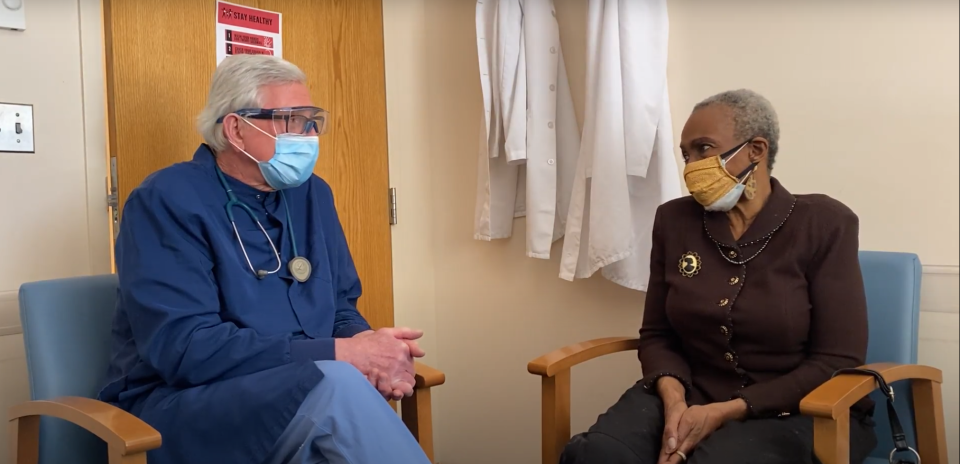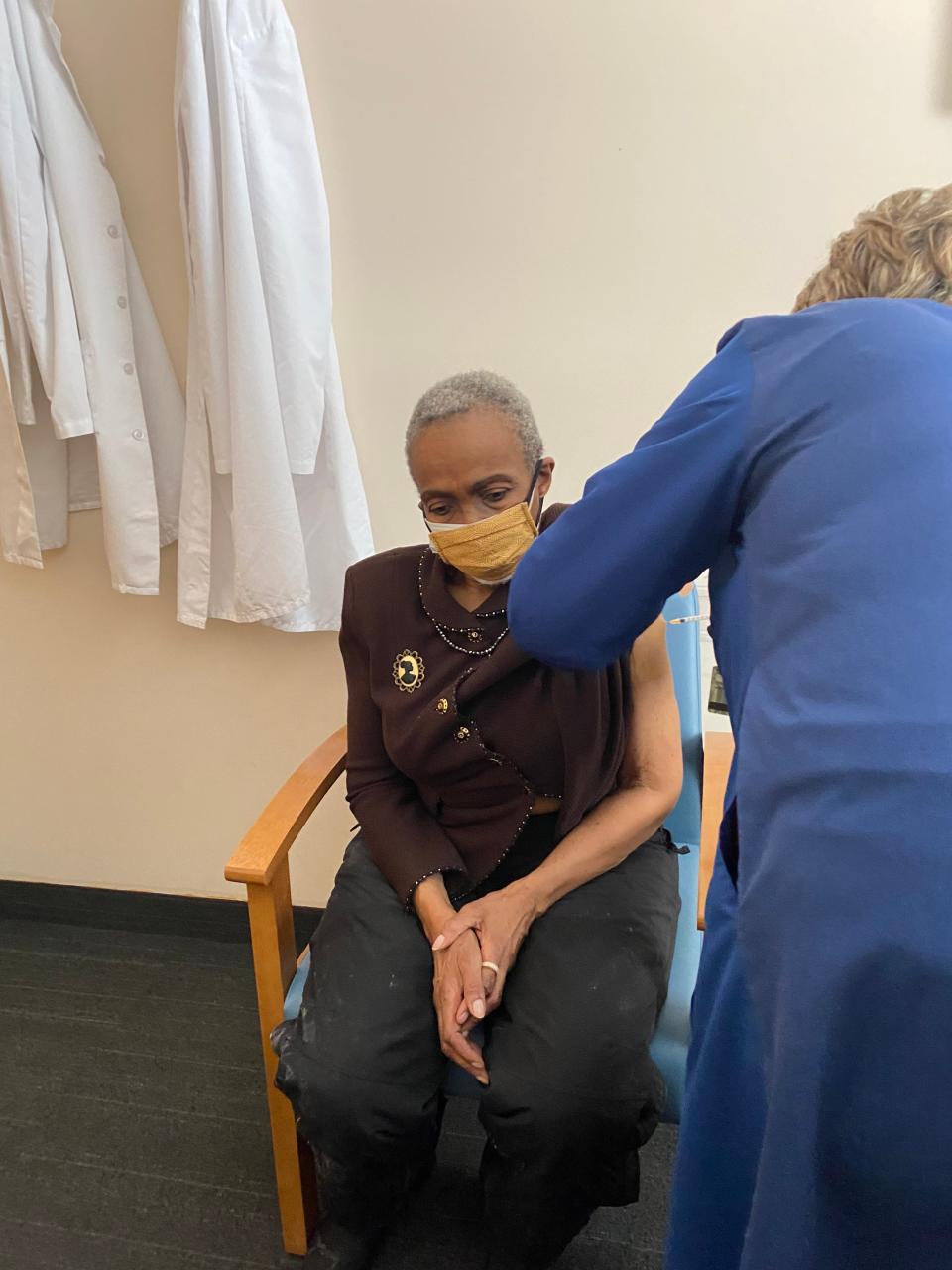For the most vulnerable Americans, these clinics are trusted, accessible and vital to vaccine rollout
When the rollout of COVID-19 vaccines began, 72-year-old Jewelean Jackson looked to Dr. Chris Reif, her longtime physician at the local Community-University Health Care Center in South Minneapolis, for reassurance.
Could she trust it? What would she tell her fellow Black neighbors when they asked if it was safe?
Similarly, doctors looked to her for insight into how they could help instill vaccine confidence in communities of color.
“Today I had the second immunization, and Dr. Reif administered it, so that was special,” Jackson, a certified community health educator, said Friday.
More than 80% of patients at the clinic are Black, Indigenous or other people of color, said the clinic’s CEO Colleen McDonald Diouf. Many suffer from chronic conditions, such as diabetes and hypertension, require language assistance or are homeless. A couple of years ago, the city’s largest homeless encampment was right across the street.

All those factors combined, the center’s patients are especially vulnerable to contracting and experiencing complications from COVID-19, making the clinic an anchor for patients amid the pandemic.
It’s a familiar story at Federally Qualified Health Centers – commonly known as community health centers – across the country. The designated clinics offer health care to underserved communities, and as people of color continue to suffer disproportionately from the virus, the centers could be essential in vaccinating hard-hit populations, experts say.
Nationwide, community health centers serve about 30 million patients. Two-thirds of them live at or below poverty, and half are racial or ethnic minorities. Most are uninsured or on Medicaid.
As part of its plan to improve the equitable distribution of vaccines, the Biden administration is targeting the community health centers as distribution hubs.
Dr. Marcella Nunez-Smith, chair of the COVID-19 Health Equity Task Force, announced earlier this month that the administration would begin shipping doses to 250 centers, at least one in each state or territory.
Initially, the effort would focus on health centers that serve specific populations, including migrant workers, agricultural workers, people with limited English proficiency, residents of public housing complexes and homeless people, Nunez-Smith said. The administration recently released a list of the clinics.
As hesitancy, fears and rumors surrounding the vaccine run rampant in communities, Jackson, former committee chair at the center, has been having conversations with friends and family to help dispel myths.
When she received a vaccine, other African American seniors at her book club said she was "crazy." Her 31-year-old daughter, skeptical of the vaccine she took, was terrified when she found out her mom took it. “I want you to live a long life,” Jackson said she told her.
Jackson said the community health centers are essential to communities like her own, with a history of medical injustices and lack of health care access.
“This system still doesn’t work for us as it should,” Jackson said. “Which is why, when you think about all that, the Community-University Health Care Center literally walks on water.”
'It's not a pretty picture': Why the lack of racial data around COVID vaccines is 'massive barrier' to better distribution

'We don't have enough'
Many health centers are experiencing unique challenges in providing care for their marginalized patients during the pandemic.
A report from the National Association of Community Health Centers found health centers reported delayed coronavirus testing results, lack of personal protective equipment and significant staff shortages – challenges the health care advocacy group said are expected to increase.
“After accounting for estimated vaccine-related costs, the total financial impact on health centers through June 2021 is estimated to be as much as $13.5 billion,” said another report from the advocacy group, which was echoed by one from the Kaiser Family Foundation.
In December, Congress passed a bipartisan coronavirus relief bill that included $4 billion reauthorized to the Community Health Center Program. The bill was signed into law during the last days of the Trump administration. President Joe Biden has called on Congress to allocate more money to support the health centers.
The Southeast Mississippi Rural Health Initiative’s clinic staff are eager to receive the extra allotment. They need more vaccine doses.
Chief Operating Officer Janice Robinson said that throughout the network’s 17 community health centers, 3,000 to 4,000 patients are on waiting lists for shots.
“We don’t have enough,” Robinson said. “This will definitely make a change.”
'It's life and death': Non-English speakers struggle to get COVID-19 vaccine across US
The network’s mission is to help control chronic illness in the state, where half the population is Black. The state suffers from the highest prevalence of obesity in the nation, and Black people suffer it and other poor health outcomes disproportionally.
Since the onset of the pandemic, the network has grappled with making sure patients receive the preventative health care and regular appointments they desperately need. While hospitals and primary care clinics relied on telehealth for virtual appointments amid social distancing, many rural Mississippians lack broadband access, Robinson said.
While Biden’s new plan allocates more vaccine to these underserved communities, staffing shortages and other logistical challenges exist. About 39% of health care centers surveyed, for example, said staffing shortages are a barrier to administering a vaccine, according to a weekly report from the Health Resources & Services Administration.
Robinson cited the same challenges. “Having enough staff to administer it all” is a problem, she said. Sustaining hard-to-fill, high-paying jobs, such as nursing positions, is difficult during periods of low patient volume and decreased revenue.
The initiative provides transportation services for patients throughout the sparsely populated rural areas but new options had to be added during the pandemic, Robinson said. As transmission rates rose, carpooling some patients relied on was no longer safe.
“Trying to meet them where they are so that we can continue to serve them the best that we can in the midst of the pandemic ... bring its own set of challenges,” said Robinson, who has been with the network for more than a decade. “We have had to increase our transportation services to make sure they can make their appointments and get the care they need."
Transportation will be essential for vaccine administration to those communities. “For a lot of our patients, we are all they have,” Robinson added. “If we were not there, some people would have nowhere to go.”

Dr. Heather Leisy treats patients at Hope Health in Florence, South Carolina. About 43% of residents are Black in Florence, and the state also suffers from a high obesity rate and other health disparities.
Leisy also cited a nurse shortage amid an increase in testing during the surge in COVID-19 cases.
“We don’t want to stop normal workflow, but we have these extra work duties on top of that, like testing or giving the vaccine, and that’s a very specialized team,” she said. “There’s been a nursing shortage … they’re being hired at very high rates per hour. That has been a difficulty, but I think that’s across (all) health care centers.”
Trusted doctors dispel vaccine fears
Back at the Community-University Health Care Center in South Minneapolis, Diouf says many of the center's patients live in multigenerational households throughout the diverse area of Somali refugees and other large ethnic groups.
With that in mind, the health center's leaders advocated for lowering the minimum age requirement to get the shot. Recently, the state pulled the age limit down to 50.
The staff has worked to build trust with the community for years. During the most trying of times, it has paid off, especially in fighting vaccine hesitancy. The medical staff is diverse and multilingual, which helps in providing care, debunking myths and answering questions about the vaccine.
“There is a lot of misinformation – they want the right information,” said chief clinical officer Dr. Roli Dwivedi.
She recalled one patient who scheduled an appointment with her just to discuss her fears about the vaccine and to ask questions. “She wanted to hear from me. She wanted to process those feelings, to hear that there’s no genetic modifications, there’s no fetal tissue in this vaccine," Dwivedi.
Another patient who has several health conditions and receives dialysis three times a week told her: "‘I’m only going to get the COVID vaccine if you are in this room and you can observe me."
Now, Dwivedi says she tells every vaccinated patient: "You’ve got the vaccine, now you’re a leader. You go out and you talk to your friends and family and share your experience so that they know we need 65% to 70% of people to have the shot before we can be safe.”
More coronavirus news from USA TODAY
Chicago leaders attempt to help communities of color get COVID-19 vaccines
The U.S. lost a whole year of life expectancy – and for Black people, it's nearly 3 times worse
Reach Nada Hassanein at nhassanein@usatoday.com or on Twitter @nhassanein_.
This article originally appeared on USA TODAY: COVID vaccine: Low-income clinics gear up to receive extra doses

 money
money 